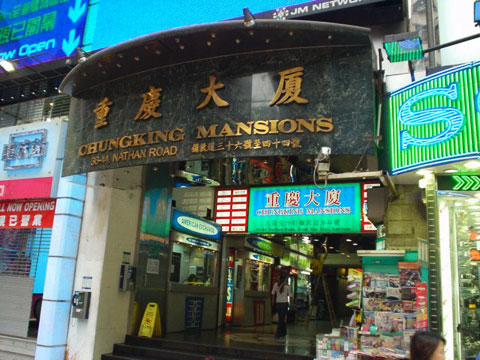The Metaphor Pusher
In search of a story – fiction by Aaron Fox-Lerner
Among the hordes of Indian and Pakistani men pushing for you to buy hashish, hostels and rolexes you hear a voice offering metaphors for cheap. You only realise it after you've stepped out of Chungking Mansions into the dense Hong Kong night air, and by that time the voice has disappeared into the dozens of milling figures, now mobbing some poor Asian tourist dumb enough to stop for them.
You've been in Hong Kong for a couple days. You were supposed to be here with your best friend as the last stage of a post-college backpacking trip, but he was called back early for a family emergency a week ago. You will be going home soon. You've been to Cambodia and Laos and Thailand and Vietnam and still don't have much to say. It looked nice and you drank a lot of beer and met a lot of other young white people.
And now you're at the end of the line. Hong Kong. Nothing to do. Nowhere to go. Here the locals are rich enough that they use imported labour to try and sell you shady products. Indian men pushing drugs and African girls pushing themselves. You're at the bottom end of the travel chain, slumming it with all the other young Westerners in Tsim Sha Tsui. You don't have much money left, not enough to really go out and do anything. You spend a lot of time in Chungking Mansions.

You eventually find yourself smoking hashish on the rooftop with a Canadian from your hostel. Chungking Mansions is a giant crumbling block of a building. Most of the floors are taken up by hostels. The bottom floor is filled by hawkers of cell phones, watches, calling cards, Indian food, drugs – and metaphors, apparently. You had not been to the roof before. It is dirty and littered with miscellaneous junk. This is not surprising.
The Canadian's travel plan for Hong Kong is simple and ingenious. He's not leaving Chungking Mansions. He came here straight from the airport and won't leave until he gets on the MTR and transfers to the train back. He can get everything he needs here. You're envious you hadn't thought of this first. That would be something approaching a story for back home, probably more interesting and definitely more dignified than telling people how you threw up four times in a Cambodian river.
You ask him if he doesn't want to see a more authentic view of the city. This launches him on a spiel about how travelling is just following a preset group of options. The whole business is like a videogame, he says, or one of those old choose-your-own-adventure novels.
You ask him how so. He answers that you have a limited series of options disguised as endless choice. You're told you have countless story options to discover, but then all you can really do is choose to continue to page 83 or page 132. You can't even decide to have the character leave for a walk in the park or use the bathroom. Here, you're in a cage of language. Your whole experience is constructed by whom you can communicate with. Even if you do know the language, you're still visibly an outsider. You're sold the idea that to travel is broaden your life's choices, but really everyone backpacking out here is forced into the same variety of scripts.
Later, leaving Chungking Mansions again, you push through the throng of hustlers and suddenly there's the voice. You want metaphors, it asks, you looking for metaphors? You turn around. He's about your age. Indian, skinny, short hair, loose clothes, cheap-looking.
You ask him what he means. Metaphors, he says. He's selling metaphors. You want to have an experience? Something really, actually, seriously special? But how? He shrugs, how much can you pay? No, not how much, how. How can he do it? He tells you that he can't say. So do you want to buy? He's pressing you. You can't really pay, you say, you don't have much money. And he's gone, back into the milling band. Now a man is selling you calling cards and you walk on.
The next day is your last before taking a red eye flight home. You step out and the metaphor pusher is hustling out front again. You try to question him some more, but he starts to shrug you off. If you don't want to buy anything, don't bother him, he tells you. He has other people to sell to. You ask him who. Who are these people buying metaphors? People, he says. He's not interested in talking. Everyone around him acts as if metaphors are no different than calling cards or drugs or hostel rooms. You go for a walk and come back in the early afternoon.
As you walk back in you notice the metaphor vendor's not there. You ask shyly around but no one can say anything about him. One man says that maybe he got arrested, before hustling off after what looks like a Scandinavian couple. You think that was a joke. You take the elevator up to the 7th floor to go to a cheap Pakistani restaurant. You sit down, order some curry, and then in walks the Canadian. You get to talking about the metaphor pusher down in the lobby, now M.I.A. The Canadian grows excited for your sake. Don't you get it, he says, that guy just gave you his services free of charge. You got what he was selling without having to pay him a dime.
It's not until that night, as you sit on the shuttle train to the airport, that you start to think about what the Canadian said. And it's true, you realise with a swelling glow that starts to fuzz out the melancholy Hong Kong had inspired in you. Here at the dead end of a voyage marked by pleasant clichés, you had your story. He gave you a tale for back home. And you didn't pay anything for his services. Soon the whole thing is a story, a lengthy anecdote. Hong Kong is no longer a confusing, harsh place but a setting, and that man is no longer another human lost in its flow, but a character.
As you settle into your seat and count down the time until you are surrounded entirely by those who look and sound like you, you recall your conversation with the Canadian about choosing your own adventure, and are struck by the most clever little framing piece, the neatest way to present your story. It all settles comfortably in your mind and this feeling seems ready to carry you into your plane and across the sea, back to those who still occupy the real world in your mind.
•
This work originally appeared in audio form in Bound Off. Aaron Fox-Lerner was born in Los Angeles and lives in Beijing. Read his last post for the Anthill here


















